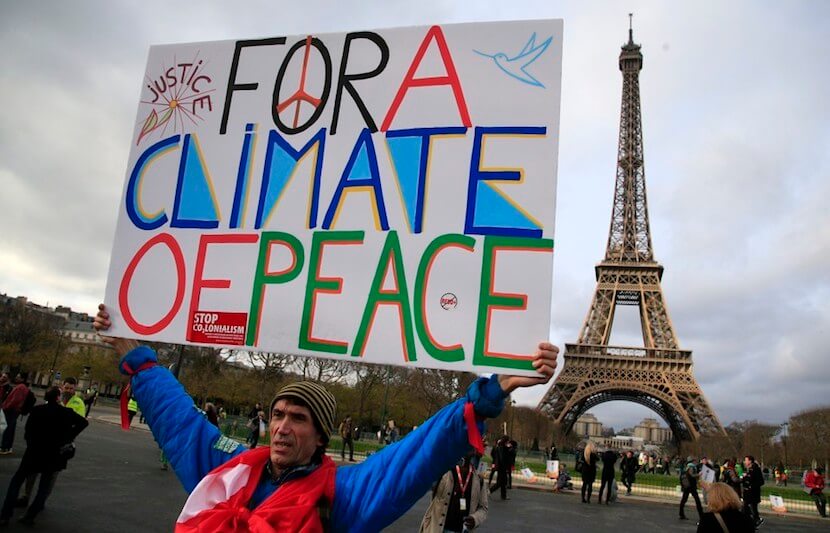After much controversy and speculation, President Trump has decided to withdraw the U.S. from the Paris climate agreement, as of today June 1, 2017.
In an announcement, Trump stated that he decided to withdraw from the agreement because he deemed it unfair to the U.S., but he indicated that he would be willing to negotiate a new deal. “I was elected to represent the citizens of Pittsburgh, not Paris,” Trump said. “We’re getting out. And we will start to renegotiate and we’ll see if there’s a better deal. If we can, great. If we can’t, that’s fine,” he added. “The agreement is a massive redistribution of U.S. wealth to other countries,” said Trump. It is “less about the climate and more about other countries gaining a financial advantage over the U.S.,” Trump proclaimed.
The Paris Agreement was signed by 195 countries on April 22, 2016 (Earth Day) in an effort to “strengthen the global response to the threat of climate change.” It is an agreement under the United Nations Framework Convention on Climate Change, and was created to innovate ways to limit greenhouse gas emissions on a global scale.
The U.S. emits 15 percent of the world’s carbon dioxide, making it the second biggest greenhouse gas emitter in the world. Now, the U.S. joins Syria and Nicaragua as the only countries that will NOT join the Paris Agreement.
Obama used an Executive Order to sign on to the agreement in 2016, which is why Trump has the power to make his decision without approval from the Senate. After signing on, Obama called it “the best chance we have” to save the planet.
President Trump’s cabinet was split on the decision. White House Chief Strategist Steve Bannon and Chief Strategist and EPA Administrator Scott Pruitt were two of the cabinet members pushing Trump towards a decision to exit the Paris Agreement. They argued that the agreement is harmful to the U.S. economy.
Elon Musk, Tesla CEO and member of Trump’s Strategic and Policy Forum, was one of the most avid opponents of leaving the Paris Agreement. Musk tweeted just yesterday, “Don’t know which way Paris will go, but I’ve done all I can to advise directly to POTUS, through others in WH & via councils, that we remain.” He also tweeted that he will “have no choice but to depart councils” if Trump decides to pull out of the agreement.
Don’t know which way Paris will go, but I’ve done all I can to advise directly to POTUS, through others in WH & via councils, that we remain
— Elon Musk (@elonmusk) May 31, 2017
What does this mean for University Research Efforts Aimed at Reversing Climate Change?
A substantial amount of environmental sustainability research and technology growth takes place on college campuses. Professors, students, and researchers help lead the charge to achieve our goal of sustainability. So TUN spoke with Kathleen Merrigan, executive director of sustainability at George Washington University and former U.S. deputy secretary and chief operating officer of the U.S. Department of Agriculture, to gain insight on the impact of a U.S. withdrawal from the agreement on environmentalists’ efforts towards sustainability on college campuses.
“Clearly, it’s a setback,” Merrigan told TUN. “This decision puts us out of step with the world. We are no longer a leader. Seems we can’t even follow.”
Merrigan is concerned for the environment. “This decision, coupled with the President’s budget proposal, suggests that we should anticipate severely reduced budgets for research related to climate change across the federal government,” said Merrigan. She is also worried that “this decision will discourage young people from public service, further erode confidence in government, and inflame cynicism.”
University Climate Researchers and Activists will need to Fight Harder and Look for Other Ways to Fund Research.
This detrimental blow has the potential to spark a strong resistance movement on college campuses and by environmentalists everywhere. “We have no choice but to fight back with everything we have,” Merrigan said. “To state the obvious, the planet depends on it.”
While it may be a setback, researchers and activists who fight climate change will have to adjust their strategies. “Environmentalists may shift more attention to state and municipal government as solution centers for climate for the duration of this Administration,” said Merrigan. “I don’t anticipate that this decision will impact university operations,” Merrigan told TUN.
The science on climate is clear, irrefutable, and compelling. Colleges and universities will continue to reduce their carbon footprint. Our students demand nothing less.
With so many advocacy, research and development efforts aimed at reversing climate change taking place on college campuses throughout the U.S., Trump’s decision will likely not be a death knell for such efforts. As noted in an earlier article on TUN, the renewable energy industry is growing in part thanks to the higher education institutions that have joined and spearheaded the movement.
“University campuses are in an excellent position to make renewable microgrids, since they often have their own electric substations, especially at engineering schools,” said Timothy Corrigan, a renewable energy expert and senior power systems engineer at TRC Companies, Inc., in an earlier interview with TUN. Corrigan also notes that universities provide great test cases in that “their scale – somewhere between a large commercial building and a city – makes them an excellent platform for testing out the technologies that are needed when you go beyond 30 or 40% renewable power penetration.”
Everyday, more and more universities are joining the fight to protect the environment by reducing their carbon footprint and forging ahead with research and development on sustainability and technology that will help save the environment. So while Trump’s decision to pull out of the Paris Agreement may be a setback for reversing climate change, it shouldn’t stop the momentum taking place at universities today. If anything, it may strengthen their resolve.




